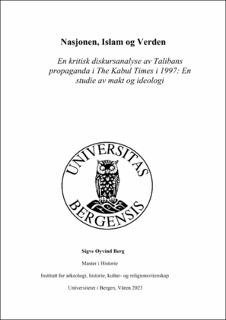Nasjonen, Islam og Verden En kritisk diskursanalyse av Talibans propaganda i The Kabul Times i 1997: En studie av makt og ideologi
Master thesis
Permanent lenke
https://hdl.handle.net/11250/3072123Utgivelsesdato
2023-05-15Metadata
Vis full innførselSamlinger
- Master theses [240]
Sammendrag
Afghanistan's history has been marked by significant events such as civil war, European imperialism, foreign interventions, and attempts at reform and modernization. The country experienced a golden age in the 1960s and 1970s after a new constitution was established, but this was short-lived due to increased communist influence and the Soviet Union's invasion in 1979. The Taliban emerged as an Islamic freedom movement, but their regime became repressive and based on Sharia laws. Afghanistan's modern development has been limited by cultural diversity and foreign intervention, as well as political divisions and conservative attitudes, which have roots in a historically strong tribal society. This master thesis is a critical discourse analysis of The Kabul Times, a national and English-language newspaper under Taliban control in Afghanistan in 1997. The study aims to understand how the Taliban portrayed themselves in the newspaper and how they legitimized their rule based on three sub-questions: How do the Taliban portray themselves and the nation in The Kabul Times in 1997? How does the Taliban use Islamic rhetoric to present themselves as peacemakers and state builders? How do the Taliban present themselves in relation to the world? and what type of recognition are they seeking? This study examines how the Taliban used media as a part of their oppressive policies to legitimize an Islamic fundamentalistic state. Benedict Anderson`s theory of the nation as an imagined community was used to analyze the Taliban`s discourse and the newspaper`s content. The findings confirm the hypothesis that the Taliban presents itself in The Kabul Times as a nation-building/nationalists liberation movement based on Islamic fundamentalist principles that also seek international acceptance and legitimacy. The study concludes that the Taliban used the newspaper to spread their ideology and gain power, portraying their ideal national state as an imagined community that promotes national values such as sovereignty, integrity, comradeship, and strength. Their rhetoric emphasized their legitimacy as representatives of the Afghan people and cultural and religious heritage to gain recognition. They also positioned themselves against previous colonial powers to seek international legitimacy.
